

Regulation of Investigatory Powers Act 2000. Regulation of Investigatory Powers Act 2000. Legislation.gov.uk The National Archives Search Legislation Advanced Search Regulation of Investigatory Powers Act 2000 You are here: Table of ContentsContentExplanatory NotesMore Resources What Version Opening OptionsExpand opening options More Resources Original Print PDF View more Print Options Changes to legislation: There are outstanding changes not yet made by the legislation.gov.uk editorial team to Regulation of Investigatory Powers Act 2000.
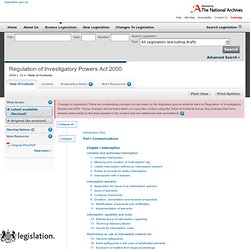
Collapse all - Back to top Options/Help All content is available under the Open Government Licence v2.0 except where otherwise stated© Crown copyright. Tempora. Tempora is a clandestine security electronic surveillance program tested in 2008,[2] established in 2011 and operated by the British Government Communications Headquarters (GCHQ).
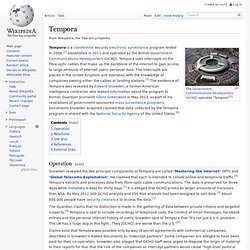
Tempora uses intercepts on the fibre-optic cables that make up the backbone of the internet to gain access to large amounts of internet users' personal data. The intercepts are placed in the United Kingdom and overseas, with the knowledge of companies owning either the cables or landing stations.[3] The existence of Tempora was revealed by Edward Snowden, a former American intelligence contractor who leaked information about the program to former Guardian journalist Glenn Greenwald in May 2013, as part of his revelations of government-sponsored mass surveillance programs. Documents Snowden acquired claimed that data collected by the Tempora program is shared with the National Security Agency of the United States.[4] Operation[edit]
The New Snowden Revelation Is Dangerous for Anonymous — And for All of Us. The latest Snowden-related revelation is that Britain’s Government Communications Headquarters (GCHQ) proactively targeted the communications infrastructure used by the online activist collective known as Anonymous.
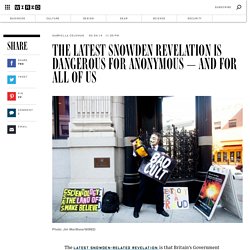
Specifically, they implemented distributed denial-of-service (DDoS) attacks on the internet relay chat (IRC) rooms used by Anonymous. They also implanted malware to out the personal identity details of specific participants. And while we only know for sure that the U.K.’s GCHQ and secret spy unit known as the “Joint Threat Research Intelligence Group” (JTRIG) launched these attacks in an operation called “Rolling Thunder,” the U.S.’ Government Communications Headquarters. GCHQ was originally established after the First World War as the Government Code and Cypher School (GC&CS) and was known under that name until 1946.
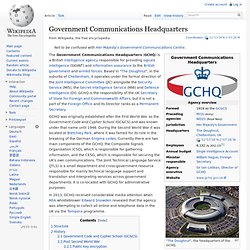
During the Second World War it was located at Bletchley Park, where it was famed for its role in the breaking of the German Enigma codes. Currently there are two main components of the GCHQ, the Composite Signals Organisation (CSO), which is responsible for gathering information, and the CESG, which is responsible for securing the UK's own communications. The Joint Technical Language Service (JTLS) is a small department and cross-government resource responsible for mainly technical language support and translation and interpreting services across government departments. It is co-located with GCHQ for administrative purposes.
In 2013, GCHQ received considerable media attention when NSA whistleblower Edward Snowden revealed that the agency was attempting to collect all online and telephone data in the UK via the Tempora programme. 2000s[edit] Docs Show NSA Targeted Wikileaks, Assange Vows Legal Fight. 'Top-secret documents from the National Security Agency and its British counterpart,' reports The Intercept on Tuesday, 'reveal for the first time how the governments of the United States and the United Kingdom targeted WikiLeaks and other activist groups with tactics ranging from covert surveillance to prosecution.' (Cartoon via Wikileaks)Following new revelations about the manner in which U.S. and U.K. spy agencies targeted the media outlet Wikileaks, the organization on Tuesday has announced its intention to legal action against the NSA and GCHQ in order to challenge what it calls an overt assault on journalism.
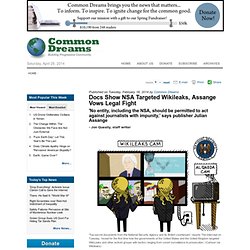
DN! NERMEEN SHAIKH: Top-secret documents leaked by Edward Snowden have revealed new details about how the United States and Britain targeted the whistleblowing website WikiLeaks after it published leaked documents about the Afghan War.
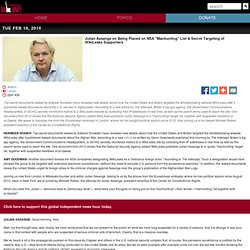
According to a new article co-written by Glenn Greenwald published this morning by The Intercept, Britain’s top spy agency, the Government Communications Headquarters, or GCHQ, secretly monitored visitors to a WikiLeaks site by collecting their IP addresses in real time as well as the search terms used to reach the site. One document from 2010 shows that the National Security Agency added WikiLeaks publisher Julian Assange to a, quote, "manhunting" target list, together with suspected members of al-Qaeda. AMY GOODMAN: Another document reveals the NSA considered designating WikiLeaks as a "malicious foreign actor. " When you read this, Julian — welcome back to Democracy Now! Click here to support this global independent news hour today. [break] GCHQ Will Have To Start Letting Everyone Know Whether Or Not They've Been Illegally Spied On.
Last December, the IPT (Investigatory Powers Tribunal) ruled that GCHQ's surveillance programs didn't violate human rights, despite being broad and untargeted dragnets.
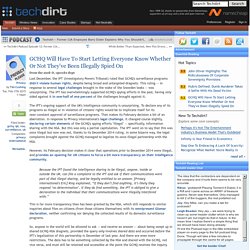
This ruling -- in response to several legal challenges brought in the wake of the Snowden leaks -- was unsurprising. The IPT has overwhelmingly supported GCHQ's spying efforts in the past, having only sided against it in one-half of one percent of the challenges brought against it. The IPT's ongoing support of the UK's intelligence community is unsurprising. To declare any of its programs as illegal or in violation of citizens' rights would be to implicate itself for its near-constant approval of surveillance programs.
That makes its February decision a bit of an aberration. However, its February decision makes it clear that operations prior to December 2014 were illegal, and provides an opening for UK citizens to force a bit more transparency on their intelligence community.